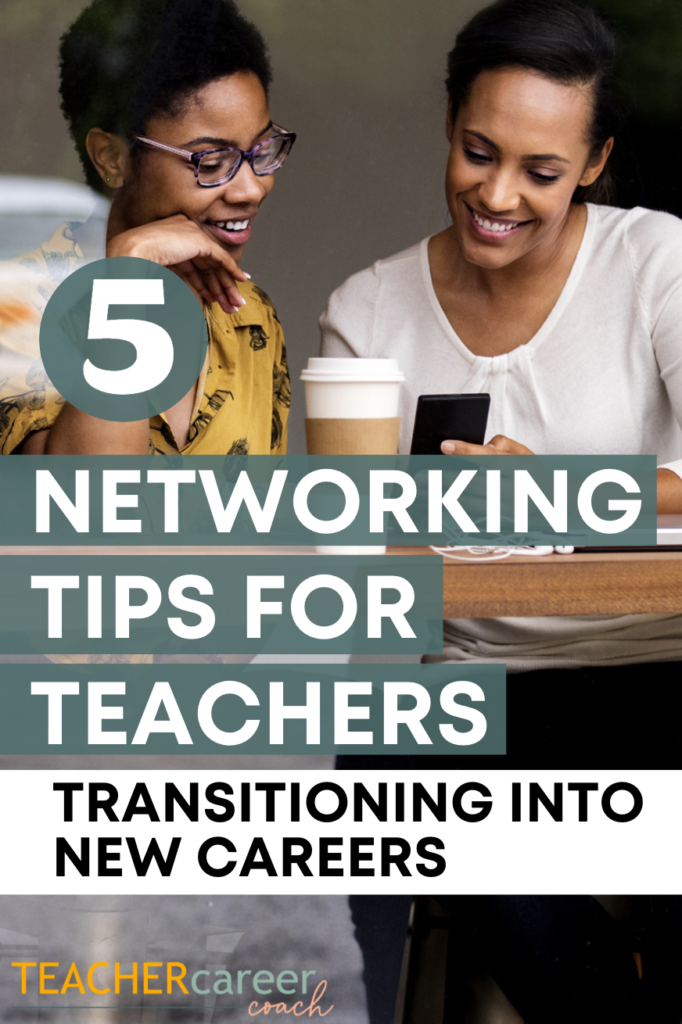Teachers, if you’re considering a career transition, networking should be at the top of your task list. Networking is often a new, and sometimes intimidating, concept for teachers looking to transition into a new career. However, for many career pivoters, it is the most crucial step to getting your foot in the door. In this blog, I’m going to share five tips for getting started with networking.
Networking for Your Teacher Career Transition
Teaching can certainly feel like a very isolated job. We operate in the bubble of our school, our classrooms, our district. Oftentimes, any type of growth opportunity or movement is based on seniority or administration recommendation. If you’re planning on a career pivot, however, it is important to step out of this small network and expand your circle.
Networking is responsible for at least 70% of the current jobs today. A recommendation from someone in your network could be the difference between getting your resume seen or ending up lost in the middle of the virtual pile. When a teacher is looking to transition out of the classroom, networking should be one of the FIRST action items.
Related: Importance of Networking in Education

5 Networking Tips for Teachers
1. Networking is a Long Game, Get Started NOW
For many teachers beginning their career transition, networking is a long-term strategy. You will be making connections and reconnecting, but often people in your networking circle may not immediately have an open opportunity for you. When it does happen quickly, it’s great! But I don’t want you to feel defeated or that you’ve wasted your time if the right position isn’t open right now.
I like to think of it as planting seeds. You may not have that immediate gratification, however one of these connections might circle back around when the right position opens up in the future. You could end up being a highly recommended candidate for a new role based off of the seeds that you planted today.
Many teachers hesitate to start networking for a variety of reasons. It may feel intimidating to reach out to new people. Or you might feel guilty about telling people in your circle that you’re leaving the profession. Other teachers may put off networking until very late in the school year because they don’t want to break contract.
However, if you’ve decided to change careers, it’s important to start planting these seeds. Even if you’re not actively applying for jobs. Even if your resume isn’t complete. Networking takes time, and the best time to start is now.
2. Networking with Friends, Family, and Former Teachers
One of the best ways for teachers to begin networking is reaching out to people you already know. If you have not told your friends and your family that you are interested in a role and what direction you’re looking for, it’s time to be a little more vocal about it. Additionally, if you know any teachers who have left the classroom, reach out and ask about their experience.
Most people will not make the inference to offer you positions that they hear about unless you explicitly tell them that you are looking for a job. Let your circle know if you’re looking into a specific field or if you would be open to a variety of roles. This is especially important if you are planning on exiting the world of education. It may feel taboo to tell a teacher about a corporate trainer position, but maybe that’s just the role you’re looking for.
Reach out to your personal network of friends, former colleagues, and family members who work in industries that interest you. Talking with people you already know is a great way to learn about all kinds of different opportunities you may not be familiar with, company culture, and the interview process as well as lead to the next step.
3. Getting Warm Introductions
Generally, teachers will need to begin networking outside their established circle to make more professional connections. A great way to get started with this is asking your personal network to introduce you to people they know who are working in an industry you’d like to explore.
For example, you reached out to a friend to grab a coffee and got to talking about your job search. Your friend shares that she has a cousin that is a guide at a local museum and loves it! At that point, if you are open to the variety of positions at museums that teachers could potentially be qualified for (children’s activities director, events coordinator, education outreach, etc.), you may want to ask your friend to introduce you. This introduction could lead to a conversation about what it’s like working at a museum, different roles that you may be interested in, and potentially open positions or a future referral.
These warm introductions could happen in-person, online, or over social media. They may not lead directly to a job (unless this cousin is also a hiring manager), but are part of a long-term strategy that will help you expand you network of professional connections.
4. Begin Networking Online
Social media platforms link Linkedin, Instagram, and Facebook can be great for teachers to begin networking with people who are currently working in your desired role or company. But always keep in mind, your overall strategy is to build professional relationships.
Think of this you would with teaching, the longer someone has been in the desired role, the better. You would you not send a first-year teacher to receive mentorship from another first-year teacher.
It’s important for teachers to make authentic connections online when networking. If you’re introducing yourself for the very first time, please don’t ask for a job recommendation in the same breath! Comment on posts, add value, show interest. Look for commonalities and start genuine conversations. It’s okay to reach out to new people, but keep it brief. “Hey could you point me in the right direction?” or “I’d love to hear more about your experience with…” are going to be more well received than a referral request with a bullet pointed list of questions about the company and position.
One thing you need to be aware of when networking online:
Please always remain professional – whether you are posting on your own profile or reaching out to someone new. Sharing a lot of negative comments on Linkedin about why you’re leaving teaching, for example. Or posting any kind of negative posts about your current job on your public Facebook profile. These can be a red flag for hiring managers. It may appear to a hiring manager or networking acquaintance that aren’t moving forward. You potentially could appear to be difficult to work with. Or you may be labeled as “just” a former teacher, and it may be hard to see you in the position you’re trying to obtain.
Use this time to learn from others. Always be mindful of their time and what you are asking them. You can ask them for recommendations of where they suggest you go to learn more about their industry or what would make you stand out as a more qualified candidate for the position.
5. Using Referrals when Networking
Finally, some companies offer a monetary bonus to current employees who refer a new hire. If you’ve pinpointed an open position that you’d like to apply for, it is smart to reach out to your connections at the company to let them know that you’re interested.
However, it’s important to keep in mind that asking for a recommendation directly is not always a great idea. This is especially true if you haven’t established a relationship. If your initial approach is a cold call saying, “Can you help me get my foot in the door?” it could make for some awkward conversations.
In Episode 60 of The Teacher Career Coach Podcast, I spoke with Danielle Blake. Danielle is a former teacher who used networking to land her new position as a research and insights associate. She now works for a healthcare start-up that supports students. She shared her approach to getting referrals with online networking:
“So the way I would always do it was just to reach out to somebody on LinkedIn. Say, ‘I’d love to hear your perspective on working at this company.’ And if they reciprocated, I might ask them for a brief conversation.
Then if I saw a job opening that I wanted a referral for, instead of asking directly… I might just say, “Do you have any suggestions that would set me up to be as successful as possible applying to this position?” Sometimes they would write back and say, I’m happy to refer you, and sometimes they wouldn’t. That would be an answer.”
Danielle Blake
Former Teachers who used Networking to Land a New Job
The Teacher Career Coach Community has been growing since 2018. Over the years, we have heard thousands of career-change success stories. Many of our successful transitioners attribute their success to the networking skills they learned and putting those skills to good use.
Evangelia, a former teacher and current Account Manager for an EdTech company says, “My advice would be to never stop networking! Connect with individuals on LinkedIn who work in companies you’re interested in, start conversations with them, and be open to learning and taking a leap!”
Former teacher, Vanessa, is now a Sales Development Rep. She says, “It takes time to leave teaching, but if that’s what you wanna do you can do it. Networking is strange, but helpful!!! There are communities of former teachers helping each other find new paths.”
Lesley was a teacher for fourteen years before obtaining her new position in Instructional Design. Her advice: “My biggest piece of advice is to make a plan and do your homework. This may mean fully researching and understanding the skills required for a new role, taking courses, updating your resume for the career you want, building a portfolio, and networking. It may be difficult at times, but not impossible, and most definitely worth it!â€â
Read more success stories & get advice from members of our community here.
Next steps to a new career
One of the biggest mistakes that we see teachers make is that they try to navigate this process alone. Often, they put off “researching” until the very last minute. Which sets them up for a very stressful application season. I want to help you get some clarity in the options available to you. To know EXACTLY what you need to do (and not do) in order to get your foot in the door.
You don’t have to do this on your own.
With the help of an HR expert with over 10 years of experience and a team of former teachers, I’ve created a guide to support you in the early stages of your transition out of the classroom. Tap the button below to learn more.


